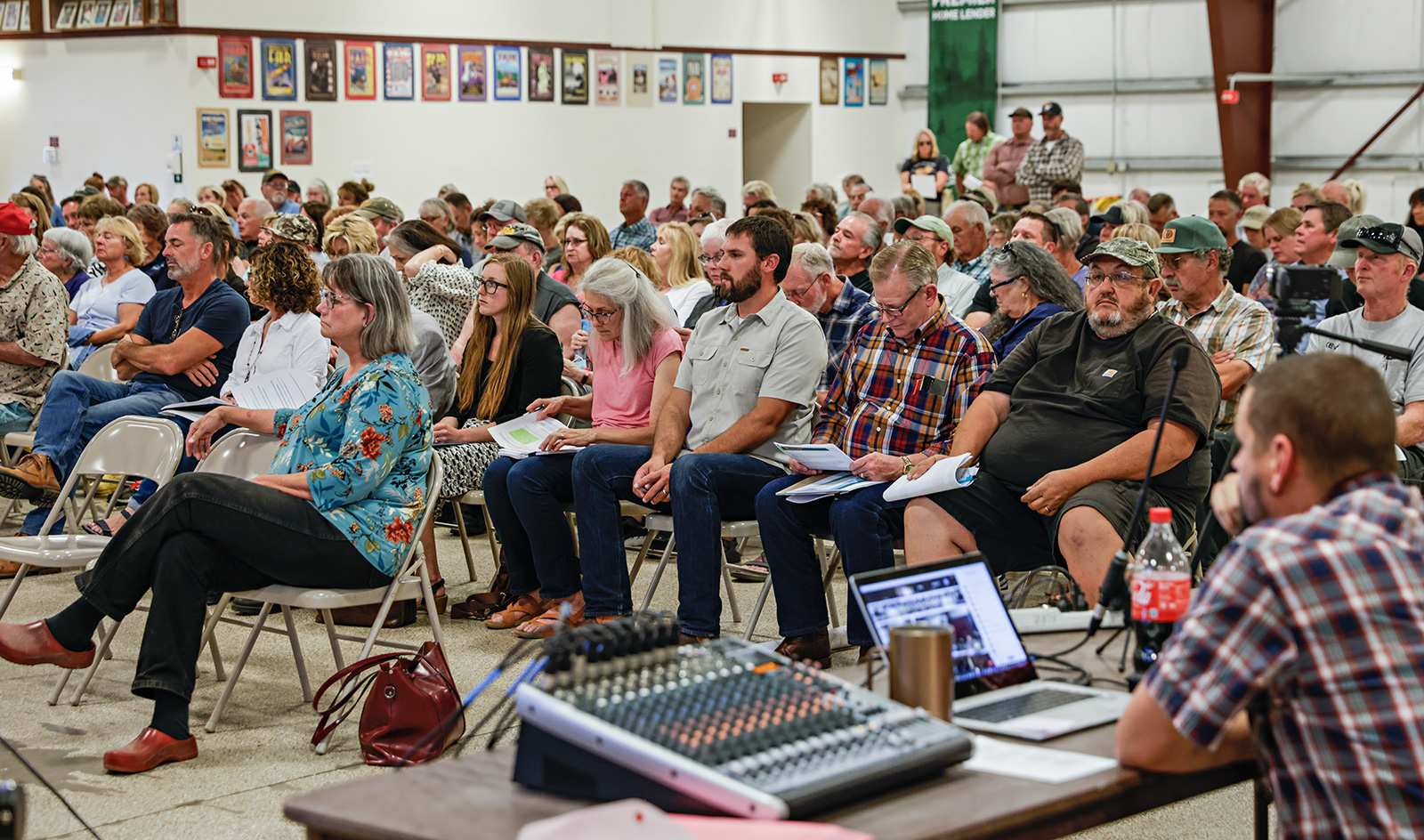County Commissioners Deny Montarise Zone Change Request
The rejection of the zoning amendment marks yet another hurdle for the developers, who hope to build a residential subdivision off of KM Ranch Road and Highway 93
By Denali Sagner
The Flathead County Board of Commissioners on Tuesday denied a zone change request for a parcel of land off of KM Ranch Road and U.S. Highway 93, the site of a proposed subdivision by Montarise Developments and its partner APEC Engineering.
The zone change requested by Montarise would have rezoned the area from SAG-5 (suburban agricultural) to R-2.5 (rural residential), reducing minimum lot sizes from 5 acres to 2.5 acres, and allowing for the development of about three times the number of homes. Under R-2.5 zoning, the developers planned to build 103 housing units on the property — 33 single-family units, 32 multi-family units, 26 recreational rental cabins and a hospice care facility with 12 dwelling units.
With the standing SAG-5 zoning, a maximum of 31 units can be constructed on the site.
The Flathead County Planning Board in February gave a negative recommendation for the zoning request, which was sent to the commissioners ahead of their official vote this week.
The denied zone change request marks yet another hurdle for Montarise in the protracted battle between the developers and KM Ranch Road residents, who have spent nearly a year organizing in opposition to the project, which they say will fundamentally alter the rural character of their neighborhood and present health and safety issues.
During the Tuesday hearing, dozens of attendees spoke in opposition to the zone change and the proposed housing development more generally, citing concerns about road safety, water supply, wildlife habitat and overdevelopment in the largely wooded area. Many warned of increased traffic, especially given the complicated and sometimes dangerous turn onto KM Ranch Road from the highway. Residents of the neighborhood recalled watching collisions on the unpaved road, a risk they said would only increase if subdivision were to be constructed under rural residential zoning.
“There’s danger in terms of the amount of traffic that would present on and off of KM Ranch Road,” Ann Britz, a resident of the area, said.
According to a traffic study conducted by Abelin Traffic Services, which was included in the Flathead County planning department staff report presented to the county commissioners, the proposed zone change would have generated 756 additional average trips along KM Ranch Road per day.
The staff report found that the proposed development could have a negative impact on motorized transportation systems, and said that future development would require approach permits from the Montana Department of Transportation (MDT) and review through MDT’s System Impact Action Process.
Concerns over density also defined the public hearing, with residents lamenting the proposed change to their largely rural community.
“I support development and responsible development. I don’t think anyone’s disagreeing that these parcels could be developed,” Debbie Pierson, who owns a property adjacent to the proposed subdivision, said. However, Pierson said that while the 5-acre parcels allowed under SAG-5 were “true to the area,” the smaller, residential zoning parcels would not be.
Anne Couser, a Whitefish resident, said that while the Flathead Valley is in desperate need of housing, the high-end Montarise units would be inaccessible to the majority of local families, at a high cost to the neighborhood.
“If the families can’t afford it, that’s not what we need up here,” Couser said. “People are struggling.”
Paul Unger, the owner of the Montarise development, and his wife, Kelly, recounted what they described as deep historical ties in the Flathead Valley and a desire to bring high-quality housing to a community that desperately needs it.
“There have been thousands of hours spent by our engineers, design staff and professional consultants in preparation for this proposal,” Paul Unger said, adding that Montarise “responded with considerable changes to our original design” based on community input.
Unger also characterized the project as a solution to the Flathead Valley’s continued housing crisis.
“This is the best way to improve affordability,” he said. “We will make it an even better project if we can work together with the community.”
Montarise Vice President Glenn Edwards said that the development process has been “very adversarial” and denied claims made by community members that the company did not solicit feedback from local residents.
“We spent almost 10 months working with the planning staff, going through all sorts of things,” Edwards said. “The reality is we worked on the safety, we worked on the health and welfare to make sure we were dealing with everything we needed to deal with.”
Edwards also rejected concerns posed about housing affordability, referencing a previous version of the Montarise proposal that included an RV park with two-thirds of its slots reserved for affordable housing.
“For some reason, that was not acceptable. All we could hear about was the traffic,” he said.
The commissioners rejected the zone change proposal unanimously, citing concerns about density.
“When you purchase a piece of property and it’s zoned in a specific manner, anything other than that is a lift for us,” Commissioner Randy Brodehl said, adding that there was not enough justification presented to rezone the area.
“It doesn’t fit in the community, doesn’t fit in the neighborhood,” Brodehl said.
“It’s a stretch for folks any time there’s change in a community,” Paul Unger told the Beacon after the commissioners’ vote.
“We would have appreciated a different outcome,” the Montarise owner said, however added that the developers do not “see this as the end of the road.”
“We intend on being part of the community for a long time,” Unger said.